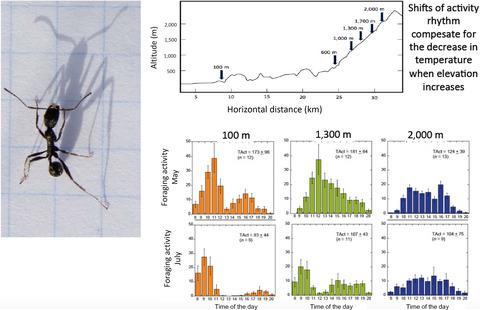当前位置:
X-MOL 学术
›
J. Anim. Ecol.
›
论文详情
Our official English website, www.x-mol.net, welcomes your
feedback! (Note: you will need to create a separate account there.)
Does social thermal regulation constrain individual thermal tolerance in an ant species?
Journal of Animal Ecology ( IF 3.5 ) Pub Date : 2020-06-23 , DOI: 10.1111/1365-2656.13268 Irene Villalta 1, 2 , Cristela Sánchez Oms 1, 2 , Elena Angulo 2 , Carlos R Molinas-González 3 , Séverine Devers 1 , Xim Cerdá 2 , Raphaël Boulay 1
Journal of Animal Ecology ( IF 3.5 ) Pub Date : 2020-06-23 , DOI: 10.1111/1365-2656.13268 Irene Villalta 1, 2 , Cristela Sánchez Oms 1, 2 , Elena Angulo 2 , Carlos R Molinas-González 3 , Séverine Devers 1 , Xim Cerdá 2 , Raphaël Boulay 1
Affiliation

|
In ants, social thermal regulation is the collective maintenance of a nest temperature that is optimal for individual colony members. In the thermophilic ant Aphaenogaster iberica, two key behaviours regulate nest temperature: seasonal nest relocation and variable nest depth. Outside the nest, foragers must adapt their activity to avoid temperatures that exceed their thermal limits. It has been suggested that social thermal regulation constrains physiological and morphological thermal adaptations at the individual level. We tested this hypothesis by examining the foraging rhythms of six populations of A. iberica, which were found at different elevations (from 100 to 2000 m) in the Sierra Nevada mountain range of southern Spain. We tested the thermal resistance of individuals from these populations under controlled conditions. Janzen's climatic variability hypothesis (CVH) states that greater climatic variability should select for organisms with broader temperature tolerances. We found that the A. iberica population at 1300 m experienced the most extreme temperatures and that ants from this population had the highest heat tolerance (LT50 = 57.55ºC). These results support CVH's validity at microclimatic scales, such as the one represented by the elevational gradient in this study. A. iberica maintains colony food intake levels across different elevations and mean daily temperatures by shifting its rhythm of activity. This efficient colony-level thermal regulation and the significant differences in individual heat tolerance that we observed among the populations suggest that behaviourally controlled thermal regulation does not constrain individual physiological adaptations for coping with extreme temperatures.
中文翻译:

社会热调节是否限制了蚂蚁物种的个体热耐受性?
在蚂蚁中,社会温度调节是对个体群体成员最佳巢穴温度的集体维持。在嗜热蚂蚁 Aphaenogaster iberica 中,有两个关键行为调节巢穴温度:季节性巢穴迁移和可变巢穴深度。在巢外,觅食者必须调整他们的活动以避免超过其热极限的温度。有人提出,社会热调节限制了个体层面的生理和形态热适应。我们通过检查在西班牙南部内华达山脉的不同海拔(100 至 2000 米)发现的 6 个 A. iberica 种群的觅食节奏来检验这一假设。我们在受控条件下测试了来自这些群体的个体的热阻。詹森 s 气候变异性假设 (CVH) 指出,更大的气候变异性应该选择具有更广泛温度耐受性的生物体。我们发现 1300 m 处的 A. iberica 种群经历了最极端的温度,并且该种群的蚂蚁具有最高的耐热性 (LT50 = 57.55ºC)。这些结果支持 CVH 在小气候尺度上的有效性,例如本研究中以海拔梯度为代表的小气候尺度。A. iberica 通过改变其活动节奏来维持不同海拔高度的群体食物摄入量和平均每日温度。
更新日期:2020-06-23
中文翻译:

社会热调节是否限制了蚂蚁物种的个体热耐受性?
在蚂蚁中,社会温度调节是对个体群体成员最佳巢穴温度的集体维持。在嗜热蚂蚁 Aphaenogaster iberica 中,有两个关键行为调节巢穴温度:季节性巢穴迁移和可变巢穴深度。在巢外,觅食者必须调整他们的活动以避免超过其热极限的温度。有人提出,社会热调节限制了个体层面的生理和形态热适应。我们通过检查在西班牙南部内华达山脉的不同海拔(100 至 2000 米)发现的 6 个 A. iberica 种群的觅食节奏来检验这一假设。我们在受控条件下测试了来自这些群体的个体的热阻。詹森 s 气候变异性假设 (CVH) 指出,更大的气候变异性应该选择具有更广泛温度耐受性的生物体。我们发现 1300 m 处的 A. iberica 种群经历了最极端的温度,并且该种群的蚂蚁具有最高的耐热性 (LT50 = 57.55ºC)。这些结果支持 CVH 在小气候尺度上的有效性,例如本研究中以海拔梯度为代表的小气候尺度。A. iberica 通过改变其活动节奏来维持不同海拔高度的群体食物摄入量和平均每日温度。











































 京公网安备 11010802027423号
京公网安备 11010802027423号